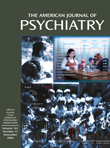Antidepressant Pharmacotherapy in the Treatment of Depression in the Very Old: A Randomized, Placebo-Controlled Trial
Abstract
OBJECTIVE: This study determined the efficacy of antidepressant medication for the treatment of depression in the “old-old.” METHOD: This randomized 8-week medication trial compared citalopram, 10–40 mg/day, to placebo in the treatment of patients 75 and older with unipolar depression. RESULTS: A total of 174 patients who were 58% women with a mean age of 79.6 years (SD=4.4) and a mean baseline Hamilton Depression Rating Scale score of 24.3 (SD=4.1) were randomly assigned to treatment at 15 sites. There was a main effect for site but not for treatment condition. The remission rate, defined as a final Hamilton depression scale score <10, was 35% for the citalopram and 33% for the placebo groups. However, patients with severe depression (baseline Hamilton depression scale score >24) tended to have a higher remission rate with medication than with placebo (35% versus 19%). CONCLUSIONS: In the oldest group of community-dwelling patients to be studied to date, medication was not more effective than placebo for the treatment of depression. However, given the considerable psychosocial support received by all patients, the placebo condition represents more than the ingestion of an inactive pill. Across sites, there was considerable range in response to medication, 18% to 82%, and to placebo, 16% to 80%.



